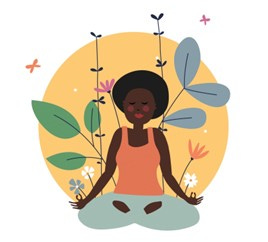Engaging in soulful self-care is multifaceted. It involves lots of elements such as balance, to-do lists, mindsets, etc. Those of you who have been reading for a while know it is something I am always thinking about (and striving to improve for myself). In the past I’ve shared various strategies and tips on how to engage in self-care and you can find some of those listed below.
I’ve noticed certain dynamics that arise around how we care for ourselves. As such, here are six questions I’ve developed to help you take stock of some of your self-care practices. My hope is that this self-inquiry will lead you to a deeper understanding of what you might need and how to provide that for yourself.
1. What helps me reconnect to my authentic self?
Restorative & Unique Care
One of the confusing things about self-care is that it’s not a “one size fits all” prescription. We are nourished by a variety of practices that won’t appeal to everyone.
For example, one of my self-care activities is beekeeping and that would send some people screaming in the other direction. My husband likes to unwind by reading tomes about history and I can’t think of anything more boring. A friend of mine loves to play board games with other people whereas that would exhaust me. We all have distinctive personalities and therefore different things will fulfill us. The key is figuring out what helps you to feel like yourself.
To know what works for us means fully knowing ourselves. The trappings of life and adulthood can sometimes get in the way of identifying our own needs and/or desires. Recently I asked someone “what would you do if you had a day to yourself?” It was hard for her to answer because it had been so long since she had any time to herself and lost track of what she might enjoy. This is a common occurrence, so if you are struggling with getting back in touch with your authentic self, spend some time exploring this question.
One way of getting back in touch with our authentic self is thinking about who we were as children, before responsibilities wore us down. What did you like to do as a ten-year-old? That might help you care for yourself in a different way.
You can also try the “I Am” exercise at the end of this post:
Engaging in that practice can provide you with a reminder of who you are. Hopefully that knowledge helps you to know how to return to that state of wholeness.
2. How can I set boundaries to ensure I am not depleted?
Protective Care
So many aspects of life can be draining. Our work will often take all that we can give it and still demand more. How might you create containers for your energy?
Maybe it’s making sure you leave work on time. Or not responding to emails after a certain hour. It may involve saying “no” to extra responsibilities or social invitations that won’t fulfill you. It might be sectioning off a block of time to do something you enjoy and not letting other things creep into that space. How can you protect yourself and your time in order to keep functioning?
When I’m overwhelmed at home, my husband and I take shifts parenting. I will tell my kids “I’m off duty (aka talk to your dad)” For more on boundaries and turning it on and off, re(read) this post:
3. Who have I felt most connected to this week?
Social Supportive Care
This is one of the reflection questions I assign to my chaplain interns to ponder each week. The answers can reveal a lot—not just about who we feel connected to, but also about who we may not feel connected to and why that might be.
You may feel most connected to a friend, a family member, or a colleague. It could be someone you’ve spent the most time with or shared a deep emotional bond with. Maybe it’s someone you’ve been supporting or someone who’s been supporting you. These connections can be fulfilling and mutually enriching.
However, a red flag arises when the only people we feel most connected to are those we care for professionally. Relying too heavily on professional relationships for connection can place undue pressure on those interactions, leading to an unhealthy imbalance.
For example, there are weeks when I feel especially connected to a patient, a student or a spiritual directee. While this can happen naturally from time to time, if it becomes a pattern—where I’m only connecting to those in a care-receiving role—it signals that I need to seek out other relationships where mutual support and shared vulnerability exist. It's crucial to cultivate connections outside of those where a power dynamic is in play.
Another way to gauge our levels of connection is reflecting on the questions:
Who is asking us how we’re feeling that gets more than “fine” as an answer?
Who is supporting us in the ups and downs of our lives?
4. What can I do today to care for myself tomorrow?
Care for Future Self
Good self-care is often boring. It covers the mundane, required aspects of care - things like routine medical screenings, paying bills and doing laundry. I don’t particularly enjoy any of these things, but they are necessary for future me to function well.
What are the small things you can do right now that future you will thank you for?
Maybe it is setting out clothes the night before or prepping meals for the week to make dinner easier. Perhaps it is getting a dental appointment scheduled. It could be reaching out to friends to get a date on the calendar for a night out.
What are the bigger things you can do right now that future you will thank you for?
It might be taking the first step toward tackling a larger project you’ve been putting off. Maybe it’s booking a vacation or scheduling a PTO day after a traditionally hard season at work. (One major thing you can do to care for your future self is filling out important advance care planning paperwork!)
5. How am I present in my care instead of distracted by my pain?
Numbing vs. Engaging in our Care
After a patient dies, I always ask the nurse involved how they will care for themselves during and after the shift. A good majority of the time, I am told “When I get home, I will pour myself an extra-large glass of wine.”
One glass of wine is acceptable (let it be noted my preference is whiskey). But it becomes a slippery slope when we start trying to numb our pain all the time. We need to be aware when our “self-care” proclivity crosses into problematic escapism. There is a difference between mindfully appreciating the wine, sip by sip versus downing it while hardly paying attention, just to quiet our nerves.
A similar tendency I see around numbing involves technology as entertainment. Whether it is streaming shows, social media or gaming, many of my chaplain students use screens to cope after a difficult day. Again, some days are awful and will be worse than others – on those days, watch all the Nextfix! But we want to keep tabs on ourselves to make sure a pattern of numbing is not emerging.
You may have heard of the term “revenge bedtime procrastination” which is when someone who doesn’t get enough time for themselves during the day will stay up late engaging in mindless scrolling or passive media consumption. When we do this, it’s not soulful self-care, instead it is setting ourselves up for failure as we will be tired the next day (see question 4).
6. Where have I experienced the Divine recently?
Transcendent Care
This is another question I ask my students to reflect on (I am a tough teacher!) and I let them know they can rephrase the question in whatever way works for their expression of spirituality.
You might ask:
“Where have I seen a glimpse of God this week?”
“When have I experienced deep peace recently?”
“When have I felt connected with the world around me?”
Whichever question you answer, the hope is by doing so you can take your spiritual pulse. It is a check-in to notice how attuned you are to the sacred. In considering it, you might sense an invitation to pay more attention to transcendence in the next few days. Or you may remember moments that were meaningful but happened amid a busy day and were almost forgotten.
Self-care, at its core, is about recognizing our needs and meeting them in ways that allow us to thrive. It isn’t static, nor is it a universal algorithm that everyone can apply in the same way. Exploring the dynamics of restoration, uniqueness, protection, future care, engagement and transcendence can help us refine our needs. My hope is that by reflecting on these questions and exploring what truly sustains us, we can create more holistic and fulfilling practices of self-care that evolve as we do!














Christine, you hit it right out of the park with your first line - 'Engaging in soulful self-care is multifaceted.' While that might be daunting, it really is a lovely invitation to figure out what we need, what works for us, and how best to go in that direction.
It's hard to give to others when our wells are empty. Thanks for your multi-faceted approach. There is something here for anyone who wants to head in that direction. Love this post.
I needed this nudge and appreciate your guidance. I am intrigued by the I Am exercise (maybe because I love the Johannine gospel tradition -- ha ha) but am not sure which exercise you are point to at the end of the post. Can you help?